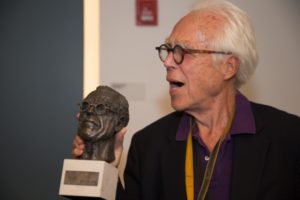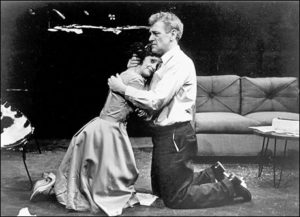Having just seen a Florida revival of John Guare’s The House of Blue Leaves, one of my favorite modern plays, I did a little electronic digging and found an online version of the “Art of Theater” interview with Guare that the Paris Review published in 1992. It’s full of characteristic observations that I feel like sharing, though you really ought to read the whole thing if it’s new to you:
 • “I felt at home in a theater. I loved being part of an audience. All the rules—the audience has to see the play on a certain date at a certain time in a certain place in a certain seat. You watched the stage in unison with strangers. The theater had intermissions where you could smoke cigarettes in the lobby and imagine you were interesting. The theater made everybody in the audience behave better, as if they were all in on the same secret. I found it amazing that what was up on that stage could make these people who didn’t know each other laugh, respond, gasp in exactly the same way at the same time.”
• “I felt at home in a theater. I loved being part of an audience. All the rules—the audience has to see the play on a certain date at a certain time in a certain place in a certain seat. You watched the stage in unison with strangers. The theater had intermissions where you could smoke cigarettes in the lobby and imagine you were interesting. The theater made everybody in the audience behave better, as if they were all in on the same secret. I found it amazing that what was up on that stage could make these people who didn’t know each other laugh, respond, gasp in exactly the same way at the same time.”
• “I learned more about basic play structure poring over the original cast albums of shows…the brainstorm that the second song was usually the ‘want’ song. And how in Guys and Dolls the need for a spot for the oldest established permanent floating crap game in New York was technically no different than those three sisters yearning to get to Moscow. The need made the story. Creating the arc and completing it.”
• “In a good playwriting course you learn which playwright you write like. And why you admire that writer.”
• It’s hard to learn from somebody like [Eugene] O’Neill. He’s great in spite of his flaws. His genius has nothing to teach others except to keep writing all your life, and maybe at the end you’ll write a few masterpieces.”
• “We can only learn one lesson from Shakespeare and that’s that there are no stage directions. It never says, Juliet (in a melancholy yet noble, quixotic way). The emotions and the intentions must be firmly embedded right in the lines.”
• “I love the part of playwriting that is a craft to be learned continually, the -wright part, like shipwright or wheelwright or cartwright. Whether Aeschylus or George S. Kaufman, a playwright is a writer who understands the technical aspects of knowing how to deliver exposition, how to get a character on and offstage, where to place the intermission, how to bring down a curtain. How to have all the characters’ stories end up simultaneously. That’s craft, and craft can be taught by emulation. You figure out how your playwright of the moment accomplishes those facts of the theater. You learn to study those playwrights technically, the way a musician does a score, breaking the work down to learn how its composer achieved certain effects. And then, having learned a technique, one can use it oneself.”
• “[Samuel] Beckett’s a great writer but a bad influence.”
• “Theater is the place where you learn all your lessons in a crowd. Imagine a novelist watching five hundred people simultaneously reading a draft of a novel and then making adjustments based on their immediate responses.”
 • “I always liked plays to be funny and early on stumbled upon the truth that farce is tragedy speeded up.”
• “I always liked plays to be funny and early on stumbled upon the truth that farce is tragedy speeded up.”
• “I don’t like autobiographical work where you can tell which character is the author because he or she is the most sensitive, the most misunderstood, the most sympathetic. Everybody including yourself should be fair game.”
• “I love actors who are performers, who are clowns—meaning they are willing to make fools of themselves, to stride that brink of panic. I feel that Stanislavsky—at least the way he’s been interpreted through the Method in America—has been the enemy of performance; I’m not interested in that style of naturalism. How we escape naturalism always seems to be the key. Naturalism is great for television and the small screen. Theatrical reality happens on a much higher plane. People on a stage are enormous, there to drive us crazy. I love actors who can do that.”
• “Writing for the movies is like working on a musical. You have to recognize and accept the collaborative aspects before you start. You have to recognize what work the camera will do, what work you must not do. You underwrite a scene in the movies. The camera will pick up textures of reality that in a play would be the business of words.”
• “Theater poetry is not just highfalutin language you spray on the event like Fry’s Venus Observed. Theater poetry is response to the large event, events that force the poetry. It took me a very long time to realize the mythic size of Ibsen, to see that the mechanics of plot in an Ibsen play function the same way that fate does in Greek tragedy. Truth does not exist merely in the actor feeling the heat of the teacup.”
* * *
A TV commercial for Jerry Zaks’ 1986 Broadway production of The House of Blue Leaves, starring John Mahoney as Artie and Swoosie Kurtz as Bananas:


